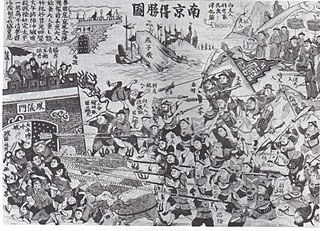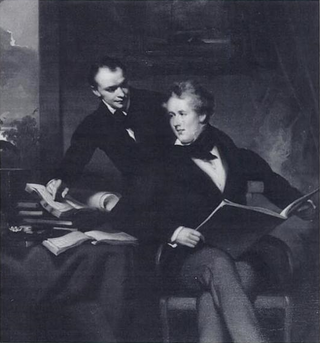Related Research Articles

The Taiping Rebellion, also known as the Taiping Civil War or the Taiping Revolution, was a civil war in China between the Manchu-led Qing dynasty and the Hakka-led Taiping Heavenly Kingdom. The conflict lasted 14 years, from its outbreak in 1850 until the fall of Taiping-controlled Nanjing—which they had renamed Tianjing "heavenly capital"—in 1864. However, the last rebel forces were not defeated until August 1871. Estimates of the conflict's death toll range between 20 and 30 million people, representing 5–10% of China's population at that time. While the Qing ultimately defeated the rebellion, the victory came at a great cost to the state's economic and political viability.
Hong Xiuquan, born Hong Huoxiu and with the courtesy name Renkun, was a Chinese revolutionary and religious leader who led the Taiping Rebellion against the Qing dynasty. He established the Taiping Heavenly Kingdom over large portions of southern China, with himself as its "Heavenly King".
Hong Tianguifu was the second and last king of the Taiping Heavenly Kingdom. He is popularly referred to as the Junior Lord (幼主). Officially, like his father Hong Xiuquan, he was the King of Heaven (天王). To differentiate, he is also called the Junior King of Heaven (幼天王).

Karl Friedrich August Gützlaff, anglicised as Charles Gutzlaff, was a German Lutheran missionary to the Far East, notable as one of the first Protestant missionaries in Bangkok, Thailand (1828) and in Korea (1832). He was also the first Lutheran missionary to China. He was a magistrate in Ningbo and Zhoushan and the second Chinese Secretary of the British administration in Hong Kong.

The Third Battle of Nanjing in 1864 was the last major engagement of the Taiping Rebellion in the Qing Empire. With the fall of Nanjing, the capital of the Taiping Heavenly Kingdom, the rebellion came to an end. The Hunan Army, an unpaid and barely fed militia commissioned by the Qing Empire, lost all their discipline and committed mass-scale random murder, wartime rape, looting and arson against the civilians of Nanjing, seen as "rebels". 200,000–300,000 "rebels" were reported dead by Zeng Guofan, the commander-in-chief of the Hunan Army.
Hong Rengan was an important leader of the Taiping Rebellion. He was a distant cousin of the movement's founder and spiritual leader Hong Xiuquan. His position as the Gan Wang resembled the role of a prime minister. He is a noted figure in history because of the sweeping reforms attempted under his rule, and because of his popularity in the West.

The Jintian Uprising was an armed revolt formally declared by Hong Xiuquan, founder and leader of the God Worshippers, on 11 January 1851 during the late Qing dynasty of China. The uprising was named after the rebel base in Jintian, a town in Guangxi within present-day Guiping. It marked the beginning of the Taiping Rebellion.

John Robert Morrison was a British interpreter and colonial official in China. Born in Macau, his father was Robert Morrison, the first Protestant missionary in China. After his father's death in 1834, Morrison replaced him as Chinese Secretary and Interpreter to the Superintendents of British Trade in China. In 1843, he was appointed as Acting Colonial Secretary of Hong Kong and a member of the Executive and Legislative Councils, but died eight days later in Hong Kong from fever.

In the early 19th century, Western colonial expansion occurred at the same time as an evangelical revival – the Second Great Awakening – throughout the English-speaking world, leading to more overseas missionary activity. The nineteenth century became known as the Great Century of modern religious missions.

Xiao Chaogui was an important leader during the early years of the Taiping Rebellion against the Qing dynasty of China. He was a sworn brother to Hong Xiuquan, the leader of the Taipings, and claimed to serve as a mouthpiece for Jesus Christ. Because of his importance to the rebellion, he was awarded the title of the "West King."

Feng Yunshan was the South King of the Taiping Heavenly Kingdom, a distant cousin and early accomplice of Hong Xiuquan, and an important leader during the Taiping Rebellion against the Qing government. He was one of the first Taipings to be baptized and established the first group of God Worshippers during the 1840s. He was killed during the initial stages of the rebellion, prior to the establishment of the Taiping's capital of Tianjing at Nanjing.

Since the arrival of Christianity in China, the Bible has been translated into many varieties of the Chinese language, both in fragments and in its totality. The first translations may have been undertaken as early as the 7th century AD, but the first printed translations appeared only in the nineteenth century. Progress on a modern translation was encumbered by denominational rivalries, theological clashes, linguistic disputes, and practical challenges at least until the publication of the Protestant Chinese Union Version in 1919, which became the basis of standard versions in use today.
Theodore Hamberg was a Swedish missionary and author active in China. He is known for his role in having authored an important account on the early Taiping rebellion and for his role in establishing Christian missions in Guangdong province. He also laid the foundations for the study of the Hakka dialect in the West.
The Baptist Convention of Hong Kong is an association of Baptist Christian churches in Hong Kong. It is affiliated with the Baptist World Alliance. The headquarters is in Mong Kok.

The Tianjing Incident was a major internal political conflict within the Taiping Heavenly Kingdom occurring during the late Qing dynasty from September 2 to October 1856. The conflict itself took place in the Taiping's capital city Tianjing. A few key leaders of the Taiping Rebellion were killed: the East King Yang Xiuqing, the North King Wei Changhui and the Yan King Qin Rigang. More than 27,000 other opposition rivals including soldiers perished in the conflict as well. The Tianjing Incident was said to be one of the factors which led to the eventual failure of the Taiping Rebellion, as well as the turning point in its fate.
The Battle of Jiangnan (1860), also known as the Second rout of the Jiangnan Battalion took place between the Qing government's Green Standard Army and the army of the Taiping Heavenly Kingdom during the Taiping Rebellion. The Green Standard Army twice attempted to besiege Nanjing, capital of the Taiping Heavenly Kingdom, but was unable to break through. To break the siege of Nanjing, the Taiping forces maneuvered to divert Qing forces by sacking Hangzhou, before quickly moving back to Nanjing to counter-encircle the Qing siege forces and routing the Green Standard Army garrison completely, breaking the siege of Nanjing.

The Taiping Heavenly Kingdom, officially the Heavenly Kingdom of Great Peace (1851–1864), was a theocratic monarchy which sought to overthrow the Qing dynasty. The Heavenly Kingdom, or Heavenly Dynasty, was led by Hong Xiuquan. Its capital was at Tianjing, present-day Nanjing. The unsuccessful war it waged against the Qing is known as the Taiping Rebellion.
John A. Rapp is an American political science professor teaching at Beloit College, USA since 1986. He primarily specialises in "Chinese politics, Communist and post-Communist systems, comparative democracies and electoral systems, and Chinese and comparative political thought."
Hong Xuanjiao, also known as Yang Yunjiao and Yang Xuanjiao, was a Chinese general and rebel leader during the Taiping Rebellion. She was said to be the younger sister of the leader of Taiping Heavenly Kingdom, Hong Xiuquan, and is the wife of Xiao Chaogui, the West King. She led women into the battlefield against the Qing dynasty for the Taiping cause.
Events from the year 1860 in China.
References
- ↑ To, Alex Kammoon (2018). Lam Chi-fung's Transformative Role in Shaping Hong Kong Baptist Life between 1950 and 1970. Vrije Universiteit Amsterdam.
{{cite book}}:|work=ignored (help) - ↑ Rapp, John A. (Autumn 2008). "Clashing Dilemmas: Hong Rengan, Issachar Roberts, and a Taiping "Murder" Mystery" (PDF). Journal of Historical Biography (4): 27–58.
- ↑ Coughlin, Margaret Morgan. Strangers in the House: J. Lewis Shuck and Issachar Roberts, First American Baptist Missionaries in China, Ph.D. dissertation, University of Virginia, 1972, p. 140.
- ↑ "Madison County Deaths - Surnames "R"". Archived from the original on 2016-10-09. Retrieved 2016-10-07.